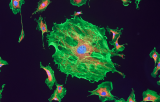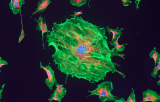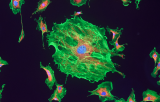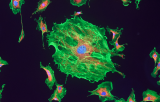
In situ hybridization probes - Chronic myeloid leukemia (CML)
Chronic myeloid leukemia (CML), also known as chronic myelogenous leukemia, is a slow-growing cancer that starts in certain blood-forming cells of the bone marrow. Myeloid cells are cells that make red blood cells, platelets, and most of white blood cells (except lymphocytes). In CML, a genetic change takes place in an early (immature) version of myeloid cells. CML is a clonal bone marrow stem cell disorder in which a proliferation of mature granulocytes (neutrophils, eosinophils and basophils) and their precursors is found.
CML occurs mostly in adults (usually begins after age 60), but very rarely it occurs in chidren too. About half of people with chronic myeloid leukemia do not initially have any signs and symptoms and are diagnosed when a blood test is performed for another reason. The treatment is the same for adults and childrens and consists on targeted drugs called tyrosine-kinase inhibitors (TKIs).





